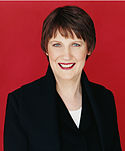Vyvlander general election, 2002
| Flag of Vyvland | |||||||
| 8th general election in Vyvland | |||||||
| ← Previous election 1998 |
Next election → 2005 | ||||||
| All 580 seats in Parliament 291+ seats needed for a majority | |||||||
| 3rd June 2002 | |||||||
|---|---|---|---|---|---|---|---|

|

|

| |||||
| Party | Conservatives | Socialists | Liberals | ||||
| Leader | Rikard Fegaad | Sofia Beket | Vredurd Dengkus | ||||
| Seat | Sjyr | Krois-1 | Kros (province) | ||||
| Share | 31.1% |
23.4% |
22.1% | ||||
| Seats | 183 (31.6%) ( |
138 (23.8%) ( |
124 (21.4%) ( | ||||
| Previous Prime Minister Rikard Fegaad Conservative-National-HU-KDH coalition |
Resulting Prime Minister Rikard Fegaad Conservative-Liberal coalition | ||||||
The Vyvlander general election, 2002 took place on the 3rd June 2002 to elect 580 members to the Parliament of Vyvland. Conservative Prime Minister Rikard Fegaad's government continued before and after the election, but the National Party, having achieved its worst ever election results, was replaced by the Liberal Party in his coalition. The election mainly saw increases for parties outside Fegaad's government, and decreases for those within. However, the Conservatives maintained their status as the largest party. The election coincided with a presidential election, in which Conservative Lurs Anterbiden was replaced by independent Bernurd Venes.
The Liberals and Socialists, the two main opposition parties, both replaced their leaders in the run-up to the election, with Vredurd Dengkus replacing Gregor Mejer for the Liberals and Sofia Beket replacing Mafjas Skenterby for the Socialists. Both parties also fared better, which was mostly seen as a reaction to Fegaad's fairly radical first government; most Liberal gains were from moderate ex-Conservative voters. This was despite high mid-term Conservative polling; many at the time and since have said that it would have been wiser for Fegaad to call an election before the term limit in 2000.
After the election, the coalition between the Liberals and Conservatives was very divided, with little in the way of policy being enacted and both parties. This led to significant changes in both coalition partners, including the formation of the Capitalist-Libertarian Party from both parties' dissenters in 2005. Meanwhile, Beket and her popular deputy, Minke Selengborg, presided over a massive surge in the Socialists' popularity.